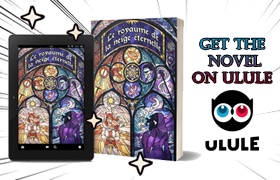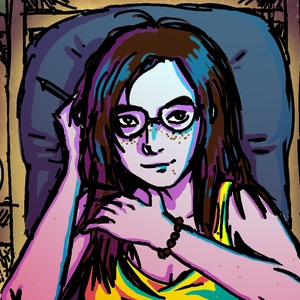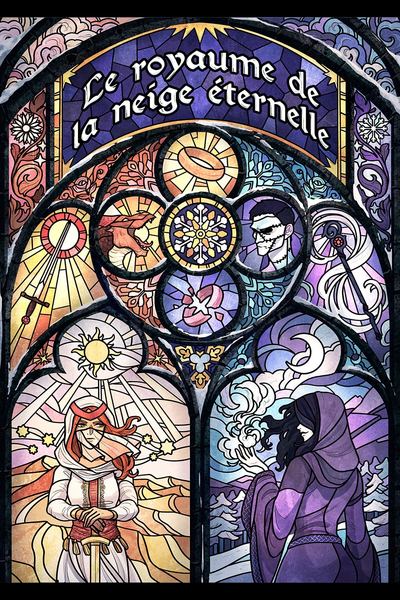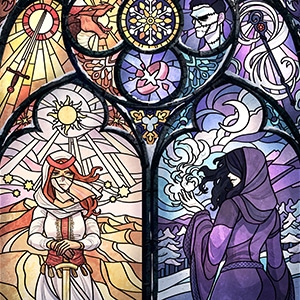A few days later, just as the euphoria of the Passing was beginning to subside, one of the temple maids came to High Priest’s room to announce the arrival of an escort sent by the king. Thalia sat up with astonishment from her chair, her mind numb, unaccustomed to being disturbed in her leisure time. A glance at the calendar reminded her that it was the last day of Yunn’s month[1], when a great festival of bullfighting and religious divination was held in the city. Surely her father had invited her to attend as a reward for her elevation.
Dressing in a crimson gown befitting the occasion and putting on her slippers, the girl joined her escort, a man nobly dressed and adorned with golden suqrenhdî, in the hall. Unaccustomed to dealing with strangers outside the temple, she smiled shyly at the man who bowed to her. The stranger introduced himself as a distant uncle, having travelled from his land in the west of the country to the capital to honour the new High Priestess of Dana. He congratulated her according to custom and showed her the royal hadhab, specific to the present sovereign, in proof of good faith. These gold seals existed only in limited quantities, a mold being made at each enthronement and destroyed soon after. Hadhabs could only be ceded by the king or crown prince. Thalia was able to recognise the seal and immediately trusted her interlocutor. Excitement overwhelmed her. As a nahika, she had already participated in the preparations for this festival, but this was the first time that her family had invited her to attend.
The uncle and niece headed together out of the residential areas of the temple, towards the tarqi[2] where a richly dressed coachman and royal guards were waiting. Her companion offered to help her climb inside. Custom forbade touching a married woman, but that was not yet the case with Thalia; moreover, their family relationship allowed them greater freedom. Nevertheless, it was no surprise that she refused: touching an individual of the opposite sex, outside the ceremonies that required it, was strictly forbidden for a nahika, let alone a High Priestess. The man nodded in appreciation and let her settle down dignifiedly at a respectable distance from him.
To get to the bullring, they had to cross the main artery of the city, passing through the Resplendent District, made up of magnificent buildings in Monas shell limestone. Recognising the pompous procession, passers-by moved aside in front of them with their foreheads on the ground.
Thalia devoured the view offered by the blinds of her door with eagerness, despite the ebony bars that separated her from the onlookers. The city around her was bright under the spring sky; red ribbons danced on all the windows with painted shutters, colourful bystanders threw petals of roses and other ruby flowers at each other. In these scarlet quiverings, the multicoloured crowd was nothing but joy and bliss. The guards maintained a security perimeter around the vehicle and numerous archers were posted on the roofs of the buildings. But none of this disturbed the euphoria of the princess, intoxicated by the hubbub, the music, the colours and the perfumes of the exalted city. The sun shone brightly in the azure and made the white travertine of Dana's arena dazzling.
When they entered the stands, her parents and siblings were already waiting for her in magnificent ruby robes. Thalia's chaperone, having accomplished his mission, greeted the royal couple before stepping aside. The young girl, after the courtesies due to her parents and elders, ran to her little brother Lucas, whom she adored more than anything. He grabbed her hands with a small shriek of joy. Two summers[3] separated them, Thalia counting sixteen and he fourteen. Lucas had already caught up with his sister in height, although his round face and high-pitched voice still betrayed the child in him. He had a goofy smile and seemed, like his sister, to see the world only through the optimistic prism of youth. Both exuded freshness and ignorance of the cruel things of life. The sight of such a duo was heart-warming for those who had the luxury of looking at them. Yes, they thought, despite the war, despite the invasion, there is still hope in pure hearts.
Thalia had two other brothers. The first, Nare, was the eldest of the siblings. Crown prince, he was bloodthirsty in hunting and war and infamous for his addiction to women and ruba[4]. The other, Lenis, was still an infant unable to move without the support of his mother's thick arms. The rest of the close relatives consisted of Calia, Alyssa and Judane, all older sisters of the priestess. These three, along with Lucas, were the spitting image of their mother, who had Pikmi ancestors[5]: light freckled skin, large green eyes and reddish curls adorning plump faces in harmony with their hefty bodies. Thalia, on the other hand, had a physique similar to that of her father and Nare: a naturally matt complexion, darker hair than the rest of her family, and a slender, lean, sturdy body.
The ceremony began. Dancers of the Order of Yunn twirled like petals in the middle of the arena, surrounded by riders of honour wearing horned helmets representing Zren. They dramatised the day when the god of war hunted a golden bull to ask for the hand of the goddess of love. The percussionists gave a signal. The dancers moved away, spinning to the edge of the arena, while the riders took their places in the centre. Priests opened a passageway, and a bull covered in gold paint entered. Massive and aggressive from fear and captivity, the bull charged forward, its sharp horns ready to rip open its foes. The riders pointed their war spears at the animal and stabbed it through. Despite its agony, the bull managed to lift one of the stallions in front of it, gutting it in the process and knocking its master to the ground, who lost consciousness. The audience murmured. Was it a bad omen sent to them by their creators? The bull died quickly afterwards, its blood mixing with the gold of its fur. The wounded man was evacuated, the dead horse pushed aside, and priests came to replace the protagonists on the soiled sand. They asked the two deities to give strength and courage to the armies that were suffering the lightning and fire of the Nordic witches.
Thalia listened with fascination to the tragic stories of the war that was raging on the borders of her country and that of the kingdom of Bonse, but did not understand a word of it. What was hatred or violence? What could be like the smoke of ransacked villages, the taste of poisoned wells, the screams of violated homes, the smell of mass grave? Even if she knew the meaning of each term, the girl had no idea of their reality, however remote. The kingdom had been prosperous and its frontiers stabilised since the reign of her great-grandfather; no battle had been lost by Danean armies for a century. Even capital punishments had become rare and were generally done away from the people. The cruel and abominable things described to her therefore seemed exaggerated and even unreal, so alien were they to her candour. Despite her inability to feel fear and sorrow commensurate with the horrors that were befalling their borders, the High Priestess did her best to help her people: she prayed every day for the rest of the dead and the protection of the living. She hoped with all her heart that the taints in the arena and the bull's entrails would be interpreted as a favourable sign from the gods.
The result was whispered to the king, who then confided in the queen. Their eyes fell gravely on Thalia, who felt the blood drain from her face. Luqius Raya Delmahni, known as the Inquisitor[6], rose from his seat and made his way to the balcony of his lodge, which overlooked the arena. All eyes were on him and there was silence, everyone wanting to know what the message of the creators was. The king's speech was brief and memorable, as usual:
"The gods have spoken," he said. "The omens are not favourable. But fear not: to remedy this, we have agreed to offer what we hold most dear. The hand of our fourth daughter, Thalia Allan'ar Delmahni, High Priestess of Dana, will be given to Prince Mark III of Corestine. This sacred bond will guarantee us the unconditional military support of Corestine, the most powerful country in the Southern Lands."
Thalia stood petrified as her fate was sealed before her eyes. Marriage? For a High Priestess? Absurd. Or perhaps not so much: when a member of the priesthood married, it was called a sacred bond. Such alliances were particularly sought after, as they were supposed to be blessed by the gods. However, one could not serve the altar and the family home at the same time, so few gave up the prestige of the temple for domestic life. Thalia had never imagined herself as a wife, and even less so after having accomplished the goal of her life, the one she had worked so hard for since childhood. The poor girl knew nothing of love – which had no place in a political marriage anyway – but she did know in theory about marital duties, including that of ensuring a lineage. The thought made her nauseous.
For the rest of the speech and
the festival, she could not make sense of what she saw or heard. Her family
spoke to her; she replied, not sure what they were saying to each other. The
answers she gave must have been satisfactory, for all but her showed a relieved
expression. When she was released from her obligations, Thalia returned to the
temple mechanically. She dropped to her knees before her prayer cushion, placed
her hands behind her head, and prayed until she was exhausted.
[1] The Daneans had a pantheon-based calendar of twelve months, each month (of thirty-one or thirty-two days) being dedicated to one of their gods. Pantheon-based calendars were widespread before the modern twenty-month calendar was introduced as a reference.
[2] Tarqi (dan.): a noble danean carriage
[3] According to the Bokimvatha, the oldest known work of the Mavanam civilisations, the Southerners should count their years of life in summers lived, the Easterners in springs, the Westerners in autumns and the Northerners in winters.
[4] Ruba (dan.): deformation of drueba (gan.), an alcoholic beverage made by distilling purple potatoes. Exported as far as the Southern Lands, its popularity gave rise to the term "ruba" to designate all distillation products.
[5] Pikmis: Ethnic group from the Famara province of the Kingdom of Dana, annexed by Luqius the Inquisitor's grandfather, Maars the Elegant.
[6] The king of Dana was called the Inquisitor because of the severity with which he dealt with non-compliance with the doctrine of his time.












Comments (0)
See all